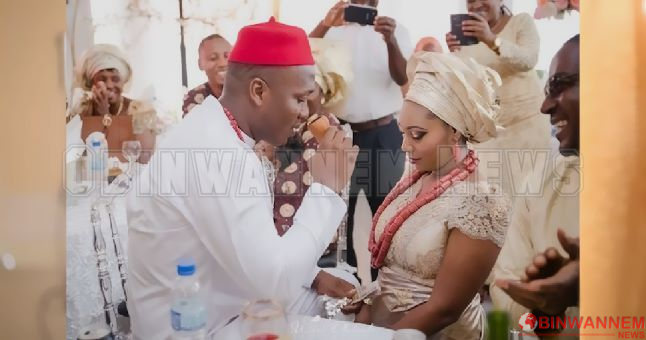“Culture defines people’s way of life.” This explanation was the easiest definition we absorbed while growing up. Irrespective of one’s religious background, culture is a necessity infused in one’s ethnicity, or nation.
Igbo as one of the ethnic nationalities mapped into Nigeria, has its own culture; same with other ethnicities across the country. However, I am afraid to say, most of these ethnic nationalities are gradually losing their culture; almost into extinction.
In this piece – as Igbo born and breed – We shall beam light on Igbo ethnic nationality.
IGBO CULTURE/TRADITIONAL MARRIAGE RITES:
As Marcus Garvey would say, “A people without the knowledge of their past history, origin and culture is like a tree without roots.”
Igbo culture encompasses their customs, practices and traditions. It comprises of ancient practices as well as new concepts added into the Igbo culture either by cultural evolution or by outside influence.
These customs and traditions include the Igbo people’s visual art, music and dance forms, as well as their attire, cuisine and language dialects. Because of their various subgroups, the variety of their culture is heightened further.
Part of these customs includes the Igbo marriage rites. During an Igbo marriage, different rites are to be accomplished from both parties (families). These rites differs slightly in some parts of Igboland, but the difference is always in addition. For instance, the Ngwa clan has additional rites appended to our traditional marriage. This we shall discuss in the next epistle.
Birth, marriage and burial are considered sacrosanct in Igboland. The trio have respective ceremonies, and rituals accordingly.
Marriage in Igboland is not just an affair between the proposed husband and wife. It also involves the parents, the extended family and villages. First, the groom asks his proposed partner to marry him.
Assuming that is in the affirmative, the groom would visit the bride’s residence accompanied by his father and/or kinsmen. The groom’s father would introduce himself and his son and explain the purpose of their arrival.
After the introductory visit, follows the discovery of family background begins. In this case, both parties go into inquiry about each other’s family; what is being inquired includes the family history, reoccurring issues, fertility, et cetera. If any of the parties finds anything negative the marriage process comes to an abrupt end.
Whereas, in cases where the discovery went well, the next phase would be to pay the bride’s dowry (in another scheduled visit) depending on the kindred’s way of doing things.
Subsequently, the D-day is the “Igbankwu nwanyi,” loosely translated as “bride’s wine carrying”. People are invited to witness the official binding of the groom and bride. lt is a major part of the lgbo traditional marriage rites that a groom performs at the bride’s parent’s Nigerian ancestral hometown; in the presence of her extended family and the groom’s close family.
Traditionally, the bride’s father would hand a gourd, filled with palm wine, to the bride and ask her to fetch her ‘husband’ amid the tumult crowd. In this process, the bride would dance – in search of her husband – with the palm wine covered by her left hand. Finally, she approaches the groom, seated among the crowd. The bride kneels down, takes a sip from the gourd, and then serves the drink to the groom. If the man drinks it then that signifies he is the one. The groom puts some money in the cup, dances with the bride to receive blessing from their parents.
Now, the crux of the matter: It is very pathetic to note that the sacredness of Igbo traditional marriage has been annihilated by the present generation. Today, the palm wine given to the bride by her father – to go fetch her husband for proper blessings – has been replaced with other foreign, and soft drinks by most people.
Sometimes, the groom, receiving the gourd from his bride, pours the palm wine on the ground. This is a sacrilegious act in Igbo tradition, because it is believed drinking the palm wine by the couple consummates the essence of their union.
In our research so far, these unguided fellows do this for the fear of being “poisoned,” perhaps by a third party. Whereas, some people flaunts religious extremism, under the guise of Christianity – in the view that palm wine has a concentration of alcohol therein – as an excuse to ignorantly distort the completeness of their hallowed marriage.
Well, whatever be the case, it is not unclear that the sacred Igbo tradition is gradually sliding into oblivion, courtesy of the “modern age”. The young people have now become an object of mischief in the face of our Igbo customs . There is not justifiable reason for one to throw their culture to the dogs.
There is every need to worry as Igbo culture keep going down while we sit back, and do absolutely nothing. Then, it behooves everyone of us; parents, especially, to nurture and guide the new age otherwise we shall inevitably sink into the cesspool of calamity.
Our culture is our identity, destroy it at your own peril.
Ugochinyere Onyechere and Ozoemela Chikwas reporting, Obinwannem News

















